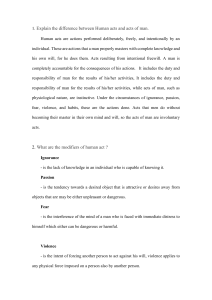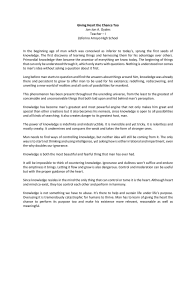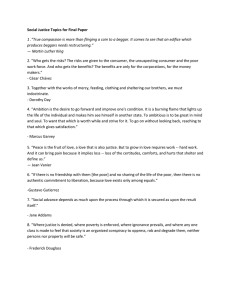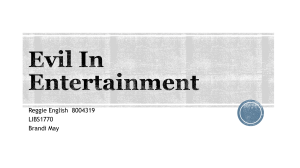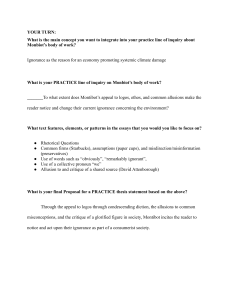Modifiers of Human Acts: Ignorance, Fear, Passion, Violence, Habit
advertisement
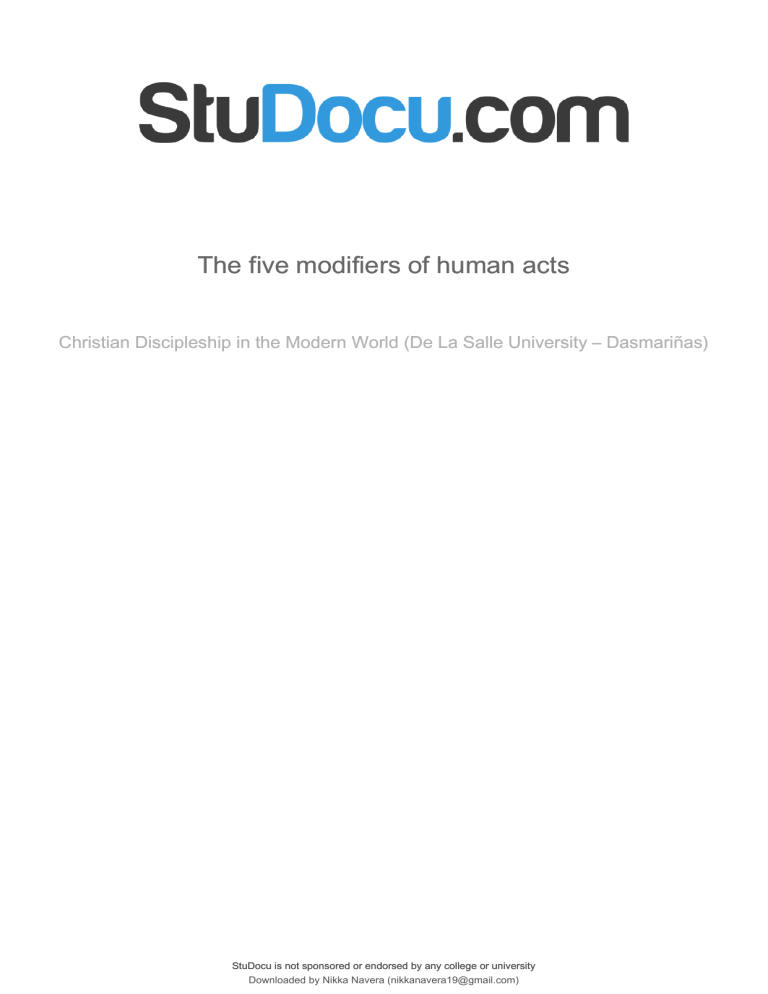
lOMoARcPSD|8227454 The five modifiers of human acts Christian Discipleship in the Modern World (De La Salle University – Dasmariñas) StuDocu is not sponsored or endorsed by any college or university Downloaded by Nikka Navera (nikkanavera19@gmail.com) lOMoARcPSD|8227454 The f ive modif ier s of human act s 1. Ign or an ce Ignorance is the lack or absence of knowledge of a person who is capable of knowing. The two types of ignorance are invincible ignorance and vincible ignorance. Invincible ignorance is a type of ignorance which cannot be dispelled, or knowledge that is lacking and cannot be acquired. The inability to dispel the ignorance or acquire the knowledge that is lacking may arise from various causes. Example: When you are in a foreign country and the speed limit is written in another alien language. Since, the ignorance cannot be expelled or dispelled by due diligence and reasonable effort then the person is not responsible. On the other hand, vincible ignorance is a type of ignorance which can and should be dispelled. It implies culpable negligence. The person could know and ought to know. Vincible ignorance can be cleared up if one is diligent enough. For instance, a person who knowingly violates safety and health protocols in a time of pandemic would be responsible for his/her actions. There are three kinds of vincible ignorance: simple vincible ignorance, crass or supine ignorance, and affected vincible ignorance. Simple vincible ignorance exists when one uses some, but not enough diligence, in an effort to remove the ignorance. It does not free us from responsibility. Suppose a nurse is unsure of dosage. She refers to the doctor’s order sheet and finds that she is unable to read the doctor’s handwriting. She knows that the doctor is at the office but does not bother to talk to the doctor. As she administers the medication, guessing at the dosage, she is guilty of simple vincible ignorance. Crass or supine ignorance is that which results from mere lack of effort. For instance, a doctor discovers in his patient certain symptoms which he does not recognize. On the shelf over his desk is a good medical book that could assist him to diagnose the symptoms. However, he does not bother due to laziness to read the medical book. Affected vincible ignorance is that which is deliberately fostered in order to avoid and obligation that knowledge might bring to light. For instance, a nurse who accepts employment with a doctor who frequently practices artificial insemination. The nurse may suspect that this is immoral or something which is contrary to the teaching of the Church but carefully avoids inquiring or even discussing the matter with anybody, lest the nurse discovers that he/she is cooperating in immorality and be obliged to leave his/her well-paying job. It is affected because she wants to be ignorant, and it is vincible because the nurse could dispel the ignorance easily. “Ignorance of the law” refers to a lack of knowledge that a particular law exists. Example: When a driver does not know that there is an 80 kilometer-per-hour speed limit for a particular road. “Ignorance of the fact” is a lack of realization that one is violating a law. Example: A driver knows that there is a 60 kilometer-per-hour speed limit but does not realize that he/she is travelling at 80 kph. There are two general moral principles concerning ignorance. First, invincible ignorance eliminates responsibility or culpability. Second, vincible ignorance does not eliminate moral responsibility but lessens it. The reason behind these two principles is that when one is invincibly ignorant, the act he/she does would then be without knowledge. Without knowledge, there can be no voluntariness, hence, no responsibility. No one can consent to violate a law which he/she does not know. In case of vincible ignorance, however, there is still culpability with regard to one’s ignorance which is due to one’s negligence or omission. Consequently, there is still accountability on the part of the parson for his/her action. The act of violating the law is still voluntary at least in cause, that is, indirectly voluntary. Downloaded by Nikka Navera (nikkanavera19@gmail.com) lOMoARcPSD|8227454 2. Fear Fear is a mental agitation or disturbance of mind brought about by the apprehension of some present or imminent danger. Grave fear is that which is present when the evil threatening is considered as serious. Intrinsic grave fear is that agitation of the mind which arises because of a disposition within one’s body or mind. Example, the fear of cancer is intrinsic. On the other hand, extrinsic grave fear is the agitation of the mind which arises from something outside oneself. Slight fear is a type of fear in which the evil threatening is either present-but-slight or grave-but-remote. Example for present-but-slight fear: an elderly man experiences fear when he hears someone passing his door at night, but his fear is slight because he knows it is probably his neighbor arriving home at usual. Example for grave-but-remote fear: a man fears that he may die of cancer in his life, but his fear is slight because the grave danger is very remote. Moral principle of fear: Fear diminishes the voluntary nature of the act. A sinful act done because of fear is somewhat less free and therefore less sinful than an act done not under the influence of fear. 3. Con cupiscen ce or Passion Concupiscence or passion is the movement of the sensitive (irrational) appetite which is produced by good or evil as apprehended by the mind. Concupiscence is not limited to sexual desire. Passions are strong tendencies towards the possession of something good or towards the avoidance of something evil. Movements of the passions are usually called feelings or emotions, especial y if not vehement. Love, hatred, joy, grief, desire, aversion, hope, courage, fear, and anger fall under this heading. Passions may be considered good when ordered by the rational will to help a person in the practice of virtue or in the attainment of what is morally good. When passions are not controlled by reason, passions may become destructive and evil. They are considered bad when used by the rational will to accomplish morally evil acts, like using courage to rob a bank. A person has the urgent duty to control and check one’s sensitive appetites since the possibility to succumb to them is not remote. Karl Peschke remarks “that the whole process of moral education, both in the early and in the later years, is to a large extent a process of gaining command over all the movements of the passions. Thus, man/woman has to eventually become master of himself/herself.” There are two types of concupiscence; antecedent concupiscence and consequent concupiscence. Antecedent concupiscence precedes an act of the will and is not willfully stimulated, such as sudden anger. On the other hand, consequent concupiscence is that which is deliberate and stimulated by the will, such as anger deliberately fostered. Moral principles regarding concupiscence: Antecedent concupiscence lessens the voluntary nature of human acts and lessens the degree of moral responsibility accordingly. Consequent concupiscence does not lessen moral responsibility. Rather, a person acting with consequent concupiscence is completely responsible. 4. Viol en ce Violence is an external force applied by someone on another in order to compel the person to perform an action against one’s will. There are two general types of violence, perfect and imperfect violence. In cases where the victim gives complete resistance, the violence is classified as perfect violence. If a woman walking a dark street at night is attacked and she attempts to fight of the attackers with all the physical powers at her command, she has been the victim of perfect violence. However, if the victim offers insufficient resistance, the violence is classified as imperfect violence. In other Downloaded by Nikka Navera (nikkanavera19@gmail.com) lOMoARcPSD|8227454 words, some resistance is shown but not as much as should be. An office secretary who is working after hours in an almost empty building is approached by the department head. The department head, suddenly filled with lustful intentions, makes certain rough and violent advances. The secretary for a moment puts up some resistance and feels that additional resistance might terminate the incident. However, the secretary quickly ceases resistance and gives in to the department head. Regarding perfect violence, the moral principle is that which is done from perfect violence is entirely involuntary, and so in such cases there is no moral responsibility. Regarding imperfect violence, the moral principle is that which is done under the influence of imperfect violence is less voluntary, and so the moral responsibility is lessened but not taken away completely. It is also important to take note that if an individual is a victim in the absolute sense of the word, no sensible person will condemn him/her. If a victim makes a judgment that resistance is utterly useless, he/she need not resist. There is no obligation to do what is useless. For instance, a bank cashier and two security guards are held up by ten heavily armed bank robbers. The cashier and the security guards know that no amount of resistance would be effective to stop the bank robbery. In this case, there is no obligation to resist because of the overwhelming threat to life of the robbery situation. 5. Habit A habit is an inclination to perform some particular action acquired by repetition and characterized by a decreased power of resistance and an increased facility of performance. It is also “a stable quality to a faculty positively inclining a person to act in a certain way.” A habit is often referred to as “second nature,” which means something is deeply embedded in an individual but ingrained by being acquired than being inborn. Habits may be good or evil as to whether they influence one to do good or evil. If a habit disposes a person to do good, it is called a virtue. However, if a habit disposes a person to de evil, it is called a vice. Moral considerations regarding habit: (1) Evil habits do not lessen the imputability of evil actions performed by force of habit, if the habit has been recognized as evil and is freely permitted to continue; (2) Evil habits lessen the imputability of evil actions performed by force of habit if one is sincerely trying to correct the habit. A habit does not destroy the voluntary nature of our acts. A person is at least, in some way, responsible for acts done from habit as long the habit is consciously allowed to endure. Downloaded by Nikka Navera (nikkanavera19@gmail.com)
